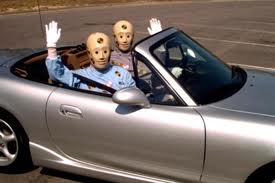 I used to have many magazine subscriptions, but since traditional print media is inexorably migrating content to the web, I now only keep one: Car & Driver. I have subscribed uninterruptedly to CD since I was a kid. Why? Because I’m a car nut and of all the auto mags, CD is in my opinion the best of the bunch. However, this isn’t an advertisement for CD, I actually have a point.
I used to have many magazine subscriptions, but since traditional print media is inexorably migrating content to the web, I now only keep one: Car & Driver. I have subscribed uninterruptedly to CD since I was a kid. Why? Because I’m a car nut and of all the auto mags, CD is in my opinion the best of the bunch. However, this isn’t an advertisement for CD, I actually have a point.
In the September ‘12 issue, Technical Editor Aaron Robinson decries the idea of the autonomous (read self-driving) automobile in his column “Google is my co-pilot. What can go wrong?” It seems Google has teamed with scientists at Stanford University to conduct research into the concept and have actually created self-driving test vehicles. Sebastian Thrun, former director of the Artificial Intelligence Lab at Stanford, wrote in a blog post on Google’s website back in 2010 that autonomous vehicles would cut road fatalities and reduce traffic congestion while freeing the driver for other activities. Like what? Like maybe crochet or Sudoku?
Mr. Robinson goes on to bemoan the trend in our society toward universal connectivity with its attendant privacy issues, as well as the unreliability of most new technologies. Believe it or not, there are cars already on the market today with the ability to interface with your smart phone and the internet. Look around your own car. If it’s a late model, I bet you have a USB port somewhere. Robinson writes,
Silicon Valley can’t be trusted with a credit-card number, and now it wants to drive your kids to school.
But here is the part of column that I wanted to highlight:
Security issues aside, I can’t imagine why anyone would voluntarily give up driving. For what? To send more texts? To watch more TV? To play Fruit Ninja? More than what we think and what we say, we are defined by what we do. And with the near ubiquity of wireless communication, much of what we do lately is watch. We watch other people doing stuff. Thanks to social media in particular, our lives are becoming a synthesis of second-hand experiences. What would be worse—a person sitting at home watching others live large on Facebook, or a person sitting in his or her car as the world passes by, watching others live large on Facebook? Thanks, but I’d rather hang on to the wheel and keep my eyes up so I can see and maneuver through the future coming at me.
Once upon a time, being master of your fate meant being master of your vessel and your course. Social tinkerers such as Thrun would prefer you to surrender your vessel to the computers, and they offer you more Facebook and Fruit Ninja in exchange. As for your fate, don’t worry about it. Whatever happens, you won’t see it coming.
Forget cars and drivers. What Robinson shines a light on here is a truth about our very lives. When we surrender responsibility for ourselves—our thoughts, our beliefs, our initiative, our actions, we likewise abjure responsibility for others. We become passengers on the road of life, inattentive to the real dangers the road presents us on a daily basis, and breeding an inability to cope with them when they arise.
Just like the driver who slams into the minivan full of kids, because he’s too busy texting, when we crash in this life, we rarely crash alone.
